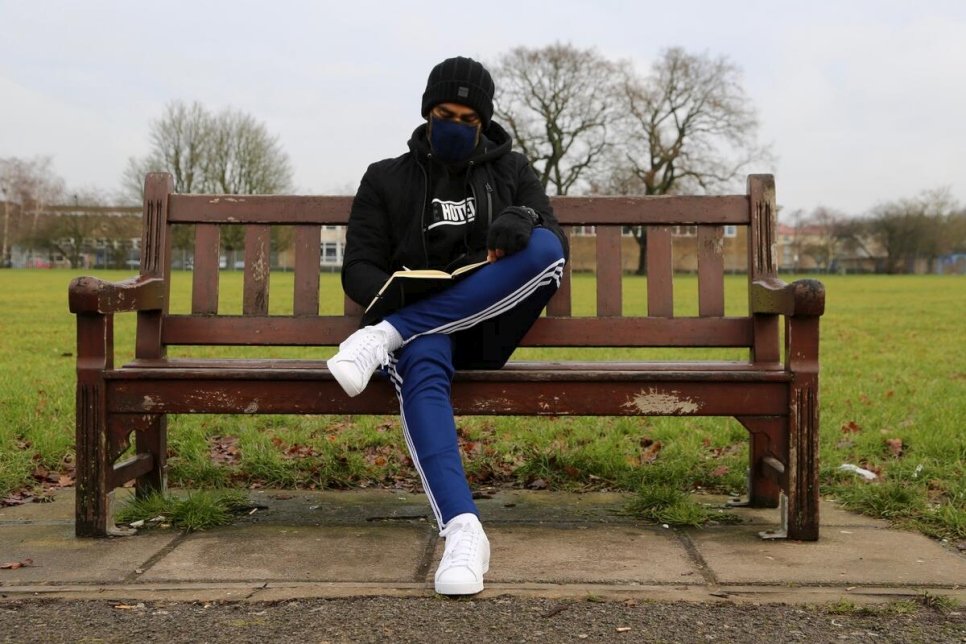Many stateless in UK face a tortuous road to recognition
UNHCR study shines light on a hidden national issue that, despite recent progress, still affects millions of people around the world.
LONDON, UK – For more than seven decades, Benjamin has lacked something that most people take for granted: a nationality. Born in Namibia, then part of South Africa, he did not acquire nationality at birth because at the time neither of his parents had citizenship or permanent residency in the country.
His Polish-born mother had emigrated from Europe after being liberated from a concentration camp at the end of the Second World War. His parents eventually naturalised as South Africans, but Benjamin was an adult by then and initially unaware that he was a citizen of neither Namibia nor South Africa.
An opponent of apartheid, Benjamin was repeatedly incarcerated in South Africa before fleeing to the UK in 1973. He was detained briefly, requested asylum, but was released without immigration status. For years, he was afraid to regularise his status in the UK, fearing deportation to South Africa. During that time, he was unaware that he was stateless, but found that, over time, his lack of documentation made life difficult. He had wanted to marry a British citizen, but they were unable to.
For many stateless people in the UK, the quest for recognition and status can be a lengthy, debilitating struggle. Through bad luck or circumstance, some in the UK find themselves citizens of nowhere. Without a nationality, they struggle for years or even decades to access services, travel abroad or adequately support themselves.
"I really want the sense of belonging."
In 2013, Benjamin learned that the UK had introduced a statelessness determination procedure, offering a route to stay legitimately. He was among the first applicants. In 2014, he was granted statelessness leave with residence for 30 months. This was renewed in 2016, and in 2019, he received indefinite leave to remain as a stateless person. He was finally able to marry.
Benjamin was delighted to be recognised. But his experience was stressful, expensive and frustrating. He has had two applications and a judicial review rejected in his quest to become a British citizen. Now in his 70s and with health issues, he still hopes to resolve his lack of nationality.
“I can’t imagine what it will be like to be a citizen, but I’d like to find out before I die,” he said. “I really want the sense of belonging.”
Many stateless people in the UK face major obstacles trying to navigate the procedures, and suffer prolonged periods in limbo, as detailed in a new study by UNHCR, the UN Refugee Agency, entitled “I am Human”.
Those interviewed spoke of their frustration and distress at the lengthy process and the limitations their lack of status involved. Many cited a deterioration in mental health and raised concerns around the quality of reviews, difficulties obtaining evidence, the use of detention and the overall process.
One of the issues that Benjamin highlighted was the difficulty faced by those trapped in the system to work legally to support themselves during the years without official status.
“Some people have had the same issue for 20 years. Why don’t they issue a work permit to let them work while they are waiting for documentation?” he asked.
The UK is a microcosm of a global problem, which consigns millions to the margins of society, unable to exercise basic rights and access services. It is often an intergenerational trap, with many children born into uncertainty.
UNHCR has a global mandate to identify, prevent and reduce statelessness, and protect stateless people. UNHCR reported that there were 4.2 million stateless people in 76 countries at the end of 2019. However, the number is estimated to be much higher as there is a lack of data.
In 2013, UNHCR developed a global action plan with states, civil society and international organisations to fight statelessness, and in 2014 launched #iBelong, a campaign to end statelessness within a decade.
Progress has been made. Turkmenistan recently introduced measures to ensure all children born in the country have their births registered. And last year, Côte d’Ivoire became the first African country to adopt a statelessness determination process.
Currently, there are no accurate estimates of total stateless numbers in the UK. The UK procedure has been in place eight years, but only about 180 people have benefitted. Last year, UNHCR UK released an audit drawing attention to good practice as well as concerns in decision-making and delays in granting leave.
"It's two steps forward, always three steps back."
Some of the stateless in the UK have found themselves without an official status through no fault of their own, the victims of administrative oversights or failures.
Paul was born in Goa, an Indian citizen. His parents were both British Overseas Citizens – a class of nationality granted under limited circumstances to people connected with former British colonies – and his father subsequently acquired full British citizenship.
Paul was issued a British passport in India in 2007. Believing he had acquired British citizenship, he then surrendered his Indian citizenship in line with Indian law. After receiving his British passport, Paul travelled to join his father in the UK. A few months later, the British authorities informed Paul that his passport had been issued in error, and he was not in fact entitled to British nationality. Subsequent applications to regain his Indian citizenship were rejected.
Positively, he recently obtained five years leave to remain after his second application for statelessness leave. Speaking before that, he described the impact of the bureaucratic “maze.”
“It’s two steps forward, always three steps back,” he said.


